Teaching Financial Habits Early
Children can start learning about saving money as soon as they’re old enough to slide coins into a piggy bank. By kindergarten, they start to understand that money is important. When they ask for allowance or want to buy a toy, it’s the perfect time to begin teaching them the basics of money management – and the values of spending and saving.
Why Does Financial Literacy Matter?
Financial literacy gives people the knowledge and skills to manage money effectively, make informed financial decisions, and achieve long-term stability. It’s essential for everyone, regardless of age or income level.
Annuity.org reveals that 75% of teens learn about personal finance from their parents, 52% from school, and 42% from social media. Despite these educational sources, 75% of teens still lack confidence in their financial knowledge. Clearly, financial literacy is more important than ever.
The Role of Parents and Guardians
Parents and guardians are the primary source of financial education for children. By modeling responsible money management and involving children in everyday financial decisions, such as budgeting for groceries or saving for a family vacation, parents can instill essential financial skills and values. These early lessons help children understand the importance of saving, budgeting, and making informed financial choices, laying the groundwork for a lifetime of financial stability and success.
Introducing Money Concepts
Start by explaining that money is used to buy goods and services. Show them different types of currency and explain that money has value because it is accepted as a medium of exchange. Next, discuss how money is earned. Explain that adults work at jobs and receive money in exchange for their time and skills. Use simple examples like doing chores at home for an allowance or selling lemonade at a stand to earn money.
Lifelong Impact of Financial Literacy
Teaching children about money management from an early age profoundly impacts their future financial stability and success. By introducing basic financial concepts, helping them understand the power of saving, and involving them in practical financial activities, parents can set the foundation for lifelong financial literacy. By starting early, we can empower our children to make informed financial decisions, achieve their goals, and navigate their financial futures with confidence and independence.












